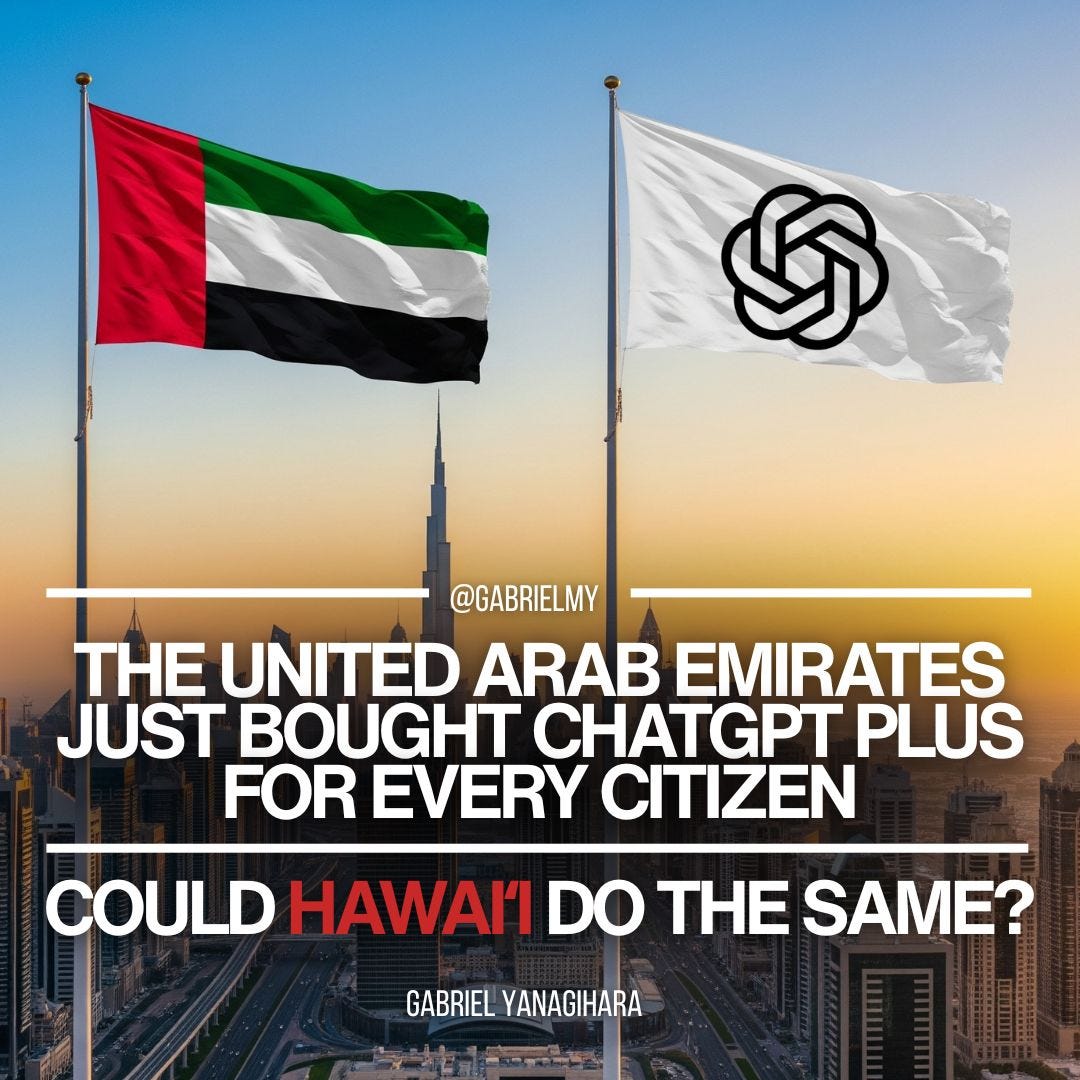The UAE Just Bought Every Citizen ChatGPT Plus. Could Hawai'i Do The Same?
Is This the Start of a Global AI Divide?
Imagine this: A country where every single resident, from keiki to kupuna, has free, premium access to the world's most advanced AI tutor, research assistant, and creative partner. It sounds like a vision plucked from a science fiction novel, but as of May 27, 2025, this audacious reality belongs to the United Arab Emirates. The UAE has just become the first nation globally to provide free ChatGPT Plus to its entire population, a move that's shaking up the global tech landscape.
This isn't just about free software; it's a $2.25 billion annual investment in national AI literacy and a direct challenge to the rest of the world. They're not merely giving away a tool; they're simultaneously constructing a massive, one-gigawatt AI supercomputing cluster, dubbed "Stargate UAE," in Abu Dhabi, with the initial 200-megawatt phase expected to become operational by next year. This ambitious project aims to enhance AI accessibility and development within the region, leveraging technological innovation for broader national objectives. The goal is to transform the UAE into a key player in the global AI landscape.
And for us here in Hawaii, this groundbreaking news raises a crucial, urgent question: What if this isn't just an isolated initiative, but the beginning of a profound global trend? What if the world rapidly bifurcates into nations with AI-literate citizens and those without? What if every person on our islands could have the legendary Library of Alexandria in their pocket – not just to read, but to actively converse with, to learn from, and to collaboratively create with? The future of AI isn't a distant prospect; it's unfolding now, and Hawaii needs to be ready to lead this inevitable transformation.
The UAE's Bold Blueprint: Foreshadowing Tomorrow's Global Divide
The UAE's strategy is deeply embedded in OpenAI's broader "OpenAI for Countries" program. This initiative transcends mere widespread access; it's about tailoring AI to local needs, ensuring data privacy, responsible AI use, and seamless integration into vital sectors like healthcare, education, and clean energy, aligning with national policies. Major tech giants, including Oracle, Nvidia, Cisco, SoftBank, Microsoft, and the UAE-based AI firm G42, are actively involved, signaling a future where advanced AI isn't a luxury, but a fundamental public utility.
This monumental commitment, potentially matching $20 billion in AI investments with the U.S. – making it one of the largest AI funding commitments globally – isn't just about economic growth. OpenAI CEO Sam Altman himself described the collaboration as "a bold vision," aimed at spreading AI benefits, such as enhanced healthcare, modern education, and sustainable energy solutions, across the globe. OpenAI's Chief Strategy Officer, Jason Kwon, is even expected to visit countries across the Asia-Pacific region to explore similar partnerships, indicating that the UAE is just the first step in their vision to help more nations develop their own AI infrastructure and capabilities.
But pause and consider the profound implications: What if this bold vision becomes the new, unspoken global baseline? What if pervasive access to advanced AI isn't merely a competitive advantage for nations, but a foundational requirement for citizen participation, economic opportunity, and even national security in the decades to come? If this trend takes hold, the UAE isn't just leading; they are dramatically illustrating a future where AI literacy becomes as universally indispensable as traditional reading and writing.
The Numbers Speak: Hawaii Can Afford to Be AI-Ready (and Why We Absolutely Must Be)
Let's ground this critical vision in our local reality. The cost of ChatGPT Plus is typically $20 per month, or $240 per year, based on the retail individual subscription rate. The UAE, with its approximately 9.4 million residents, is effectively investing the equivalent of $2.25 billion annually into its people's AI capabilities, even at this retail estimate.
Now, let's bring that projection home to Hawaii:
Population of Hawaii: Approximately 1.4 million residents.
Retail Cost of ChatGPT Plus per person/year: $240.
Total estimated statewide cost for universal access (at retail price): 1,400,000 residents×$240/year=$336,000,000 per year
While $336 million certainly sounds like a significant figure, it's crucial to understand a few things:
This is a retail estimate. With a statewide partnership, significant discounts at scale would almost certainly bring the cost down considerably, making it far more affordable.
ChatGPT isn't the only option. The landscape of advanced AI chatbots is rapidly expanding, with powerful alternatives like Claude, Gemini, and others also available. A comprehensive AI literacy program could leverage a mix of tools, some perhaps even open-source or more cost-effective for large-scale deployment.
Consider this estimated cost against a local project that has become infamous for its expenditures: the Honolulu Rail Transit Project.
The rail project's estimated final cost has ballooned to about $12.4 billion, making it one of the most expensive light-rail projects per capita globally. This massive bill is largely financed by Honolulu residents through increased taxes.
Beyond the overall budget, the project has been plagued by significant disputes, including a major ongoing lawsuit from a primary contractor for at least $324 million in damages due to alleged mismanagement and costly delays. This $324 million+ lawsuit is reportedly nearing a settlement, following a previous $60 million settlement with another contractor.
Now, for a truly striking comparison: A single major lawsuit payout from the rail project, like the one sought at over $324 million, is almost precisely the amount it would cost to provide every single resident of Hawaii with free, premium AI access for an entire year!
And on an even larger scale: For the cost of the Honolulu Rail Transit Project's current estimated total of $12.4 billion, Hawaii could provide every single resident with free, premium AI access for over 36 years! That's more than three decades of unparalleled access to knowledge, innovation, and empowerment for our entire population, far outweighing the cost of a single infrastructure project.
This isn't just an expense; it's a profound investment in our collective future—an essential insurance policy against being left behind in an increasingly AI-driven world.
A Smarter Hawaii: Why Universal AI Access is a Necessity, Not a Luxury
Free, widespread access to a tool like ChatGPT Plus isn't just a convenient perk; it's a profound enabler for societal advancement. Imagine a Hawaii where:
Every student has a personalized tutor available 24/7, adapting to their unique learning pace and style, effectively bridging educational gaps across all our islands.
Small businesses can effortlessly draft comprehensive business plans, create compelling marketing campaigns, and analyze complex market trends in seconds, truly leveling the playing field against larger corporations.
Our workforce gains cutting-edge digital skills, boosting productivity and adaptability in every sector, from tourism to technology, ensuring our economy remains robust and competitive.
Kupuna receive digital assistance in plain, locally understood language, enhancing accessibility and profoundly empowering our elders in a digital age.
Native Hawaiian language and culture are actively preserved and vibrantly integrated into next-generation AI tools, ensuring its dynamic future and reach.
Every citizen gains access to a personal research assistant, a dedicated coach, and a multilingual translator in their pocket, fundamentally democratizing knowledge and expertise for everyone.
This isn't a distant dream. It's the immediate, tangible potential when a state genuinely commits to universal AI literacy. The urgency for this transformation cannot be overstated. As generative AI continues to evolve at a staggering pace, nations and communities that fail to prioritize widespread AI literacy risk facing significant disadvantages in global competitiveness, innovation, and, critically, social equity.
Hawaii's Unique Opportunity: Leading the Global Conversation on AI for All
While the UAE charges forward with building massive AI data centers, Hawaii has a distinct and powerful opportunity to carve its own path to AI leadership by focusing on widespread AI literacy and fostering the vital public conversation about its societal necessity. Our unique blend of cherished cultural values, strong community bonds, and an inherent spirit of innovation makes us an ideal model for responsible, equitable AI integration—a model that could serve as a guiding light for other nations and communities worldwide.
This profound conviction is precisely why I've dedicated myself to this mission here at home. The imperative is clear: just as the UAE is proactively preparing its citizens for an AI-driven future, Hawaii must demonstrate the same foresight and commitment. Lagging behind is simply not an option when the technological tide is rising so swiftly.
Addressing the Big Questions: Privacy, Trust, and the Path Forward
Of course, any initiative as bold and transformative as universal AI access comes with vital, complex questions that we must address transparently and collaboratively. These are the same questions the UAE is undoubtedly grappling with, and they are absolutely essential for any society considering widespread AI integration:
How do we effectively train 1.4 million people on responsible AI use? This demands a scalable, culturally sensitive approach that seamlessly integrates AI literacy into our schools, workplaces, and community programs.
Who oversees a public AI platform in Hawaii? Establishing clear governance and accountability is paramount. Will residents trust "government-issued" AI, and how do we ensure transparency regarding data usage? Could anonymized chat histories be used to generate population-level insights or behavioral analytics?
How do we protect individual privacy and data security? Robust policies and transparent practices regarding chat history and data analysis (e.g., will the government access individual chats or only aggregated, anonymized reports?) are absolutely essential for maintaining public confidence.
Will Hawaii residents accept and truly embrace a state-supported AI assistant? Building public trust through comprehensive education, consistent communication, and a clear demonstration of tangible benefits will be key to successful adoption.
These are critical conversations, and we must initiate them now—openly, inclusively, and with a sense of urgency—before others dictate our future for us.
The Future Is Now. Let's Build It in Hawaii (for All).
OpenAI has clearly signaled that the UAE partnership is just the inaugural step in its broader global "AI for Countries" strategy. OpenAI's Chief Strategy Officer, Jason Kwon, is even expected to visit countries across the Asia-Pacific region to explore similar partnerships. More such collaborations are undoubtedly on the horizon. The world is watching.
Why not Hawaii?
Let’s be the first U.S. state to not only recognize but to actively champion and implement the necessity of AI literacy for every single resident. Let’s be the first to integrate AI into our unique culture, our indigenous language, and our core values—not as an afterthought, but intentionally, from the very beginning.
The future is here, presenting a clear, profound choice: will we be a society with AI-literate citizens, thriving in the new era, or one struggling without? Let’s ensure Hawaii is ready to shape it, not merely react to it.
Ready to explore what universal AI literacy can do for your school, business, or team?
I'm offering a free AI 101 crash course consultation. No jargon, no pressure—just real talk about what AI is, what it isn't, and how you can harness its power right now.
📧 gabrielyanagihara@gmail.com 🔗 Connect with me and learn more:





